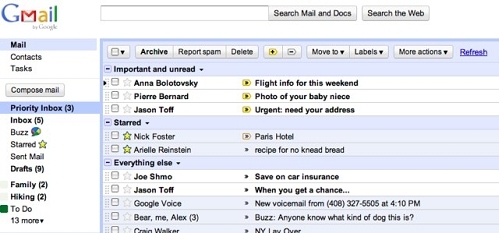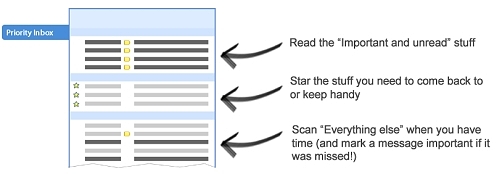As a result of hundreds of daily microtransactions with the web and a more forceful continuity of connectedness, even some of the finest organizers of information have become powerless in an attempt to manage the complexity of a more globalized lifestyle within the constraints of a temporally structured e-mail inbox interface. Thankfully, software engineers at Google have come up with an experimental new way of taking on information overload in Gmail.

Dubbed "Priority Inbox," Google's new Gmail feature is aimed a providing users a way to get through their inboxes as efficiently as possible. The technology is designed around the company's already existing spam filter algorithms, which have proven to be highly successful at filtering junk mail into the "Spam" folder. In this regard, the algorithms have been restructured to arrange messages in the "Inbox" folder that a user considers of high importance at the top of the list, and of lowest importance at the bottom of the list.
Priority Inbox uses information such as keywords, the Gmail contacts e-mailed the most and daily e-mail habits to build a semantic understanding of important e-mails in the Inbox. "We think we can get this to be pretty solid out of the box, but it gets better and better over time. It essentially learns from you," Google's group product manager of Enterprise Apps Rajen Sheth told ArsTechnica in an interview. "This is just the next evolution in making people more efficient in dealing with information overload."
As Mashable has noted, Priority Inbox is also an adaptive algorith. Marking items as important or unimportant allows the feature to have better understand of what types of messages are deemed most urgent by the user. Messages can also be priorities by recipients - for example, from a coworker or a spouse.

According to several sources, Google has already been testing Priority Inbox with business and consumer Gmail users for several months. Empirical studies performed on test subjects have shown that users are spending an average of 6 percent less time manageing e-mail after enabling the feature. "That's clearly a significant productivity gain," said Google group project manager of Enterprise Apps Rajen Sheth. "It adds up to one full workweek's worth of time per year. More importantly, it helps bring organization to chaos and draws your attention to things that need addressing."
Although the practical utility and usefulness of Gmail's new Priority Inbox feature appears harmless on the surface, we are inclined to question the security risks that an updated inbox crawling algorithm poses on sensitive personal data. Google has not commented on whether or not the algorithm ties a user's organization preferences to their respective Gmail account, or if it's more of a dynamic general filter managed by Google Labs that learns from experience and applies the same structural rules to the millions of Gmail inboxes utilizing the feature. While the company has emphasized the ability for users to create complex filters for different subjects, different interactions and different people, it has also mentioned that the enhancement is free and will automatically be added to all Gmail inboxes.
The company has already begun rolling out the feature to all users in all languages. Meanwhile, Google Apps users must enable the "pre-release features" setting before it becomes available.




